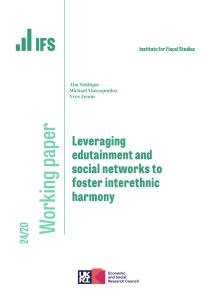Traditional estimates of the return to an additional year of schooling in the UK suggest that this is in of the order of 7%. However, the results here suggest much larger figures - perhaps in the order of 20%.
We use a large sample of UK males to address the potential endogeneity of schooling. By exploiting the experimental nature of two changes in the minimum school leaving age to uncover the effect of an exogenous increase in schooling on wages.
Our results confirm recent US work. For example, Card (1993) and Butcher and Case (1994) suggest that the estimates of schooling returns using such methods are almost double that of simple least squares methods. However, the results here provide much greater precision than has previously been the case and so substantiate the US evidence of much larger rates of return to education than traditionally thought.








